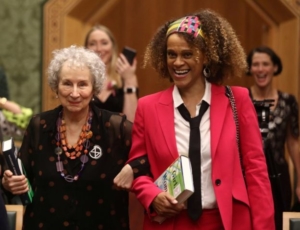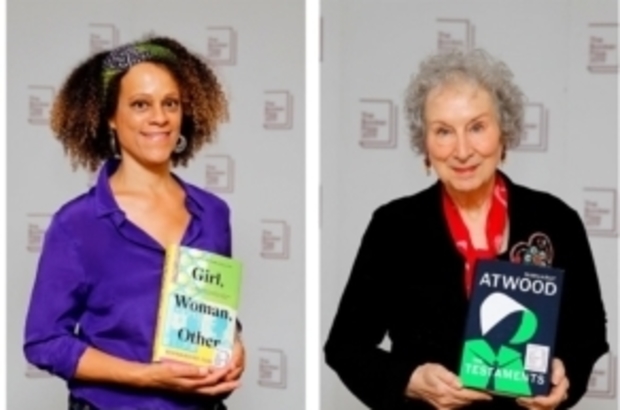JADE PEREZ reviews the outcome and ceremony of the Man Booker Prize 2019
Despite the range of highly esteemed texts which were nominated for this year’s Man Booker Prize, Margaret Atwood and Bernardine Evaristo cut through the noise with their novels The Testaments and Girl, Woman, Other, two texts which showcase a plethora of female voices.
The joint prize has raised eyebrows and sparked headlines as this is the third time since the prize began in 1969, and the first time since a new regulation stated that the award would ‘not be withheld or divided’, that there have been two winners. Despite both texts being named as likely to snatch the prize (according to the Guardian journalist Alex Preston, who deemed The Testaments a ‘clear favourite’ with the odds 2/1 and Girl, Woman, Other a close second with the odds 5/1), the choice of two winning novels has evoked feelings of surprise and unease.
The unfair playing field between the two authors has been cited repeatedly by people who are in disagreement with this year’s awarding of the prize. The Testaments has certainly benefited from a momentous amount of publicity. Plastered across bookshops, tube stops and billboards, as well as dominating social media, it is hard to escape the success of Atwood’s book. The asymmetry in the advertising of these two texts begs the question of whether The Testaments won the prize out of merit, or whether it won as a result of its reputation as canonical before it was even released.

Alongside the reverence that has been shown for Atwood are some unnerving racial implications. As the first black, female author to claim the Booker Prize, many are distraught that Evaristo is having to share the limelight with Atwood, a dominant voice in the 21st century canon. Comparisons to the recent Oscars debacle, which saw the first all-black cast feature film, Moonlight, have its winning title snatched away in seconds and handed to La La Land, a film which depicts Ryan Gosling as the modern pioneer of Jazz, have highlighted the implicit racial prejudice that surrounds the establishment in the arts.
Indeed, it appears to be a cruel twist of fate, that Girl, Woman, Other, an interlacing of 12 stories of marginalised and silenced black female characters, has been made to share its voice with Atwood’s trio of white protagonists. Evaristo’s characters range from headstrong businesswoman Carole, who struggles with her black background and how it has made the world perceive her, to young and extroverted Yazz, whose ‘amazingly wild, energetic, strong and voluminous afro’ neatly mirrors her personality. We also see ninety-three year old Hattie, ‘G-G to her descendants’ – a necessary addition to the broad cast. The novel criticises the racial stereotypes which permeate white, western literary culture, providing a refuge for all the people who fail to see themselves represented in these caricatures.
With this year’s winnings, it could be argued that the focus is less centred on the authors themselves, and more linked to the political statements that they bring to the table. The central messages of both texts resonate deeply in our world, especially in light of the #MeToo movement and the changes to American legislature regarding a woman’s right to an abortion. Though Atwood’s ensemble is far less diverse, The Testaments still allows three women, including aged Aunt Lydia, to stand testimony to the lawless treatment of women. As Atwood has frequently stated, no event in the dystopian world of Gilead is fiction.
Despite some of the more problematic aspects of having two texts win the award, it is important to regard this outcome as something to be celebrated, not scorned. The controversy surrounding the judges’ decision has incited a wave of publicity, and means that both Atwood’s and Evaristo’s texts, which challenge internalised and outdated social structures, are continuously at the forefront of media attention. The impact of these novels transcends the headlines dedicated to them. Both The Testaments and Girl, Woman, Other are flying off shelves and ingraining themselves in the minds of young girls, businessmen, and politicians alike, who perhaps need to hear what the winners have to say. Even more so, women regardless of race, age or social class, will find solace in the multitude of stories told in both Girl, Woman, Other and The Testaments.
The Booker Prize Reading reveals any outcome was an admirable one, as all six authors turn up passionate, engaging and with something new to bring to the table, each representing a part of society often overlooked in the literary canon. In his thought-provoking anecdote, the nominee Chigozie Obioma confesses in the ceremony that through his work he was ‘trying to reveal the world to you because you are too busy to see’. Hopefully this year’s scandalous award will draw attention to the prize and the books which make up the longlist and shortlist. The wide range of topics explored in the nominations will attract a kaleidoscope of readers to indulge in texts which encourage the reader to perceive the world through a new perspective.
Featured image source: gettyimages.co.uk





